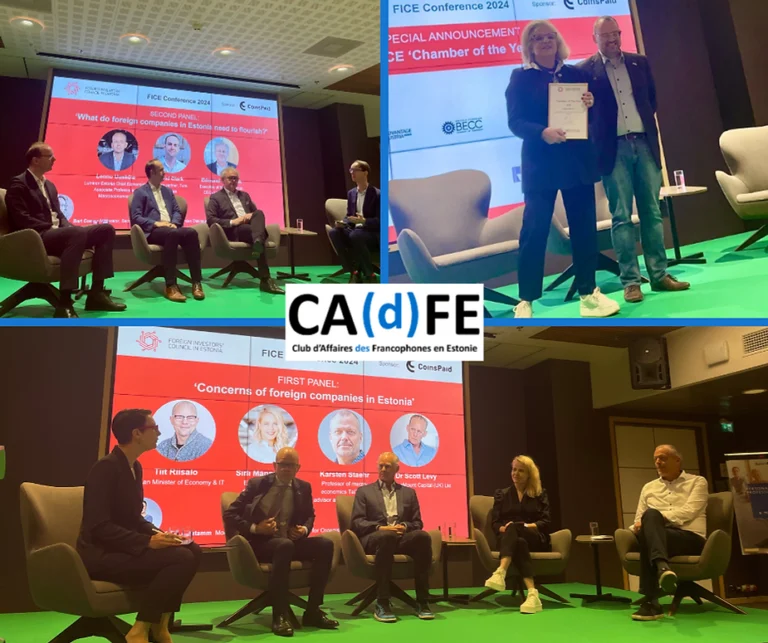
Analysis of the FICE 2024 conference: Challenges and opportunities for foreign companies in Estonia

The conference focused on the findings of FICE’s executive survey, which is based on responses from a large number of foreign investors and FICE members. The survey aimed to provide an overview of investment trends in Estonia for the year 2023, including growth, salaries, as well as information on future investment projects and concerns regarding Estonia’s economic growth.
The FICE 2024 Executive Report highlights both the promise and the challenges facing the Estonian economy.
Based on information from business leaders, the report offers a comprehensive overview of current sentiments, revealing a mixture of optimism and apprehension.
The lack of regulatory stability and dialogue between the public and private sectors has exacerbated uncertainty for businesses. Almost half of respondents (47.8%) expressed dissatisfaction with the Estonian government’s responsiveness to their concerns, particularly with regard to recent tax increases and corporate tax reforms.
In addition, insufficient investment in research and development (R&D) and shortcomings in the education system are also hampering Estonia’s growth potential.
Recommendations for growth :
– Strengthening vocational education: Focusing on vocational education and strengthening links between industries to effectively address skills shortages.
– Attracting skilled labor: Relax regulations and visa quotas to attract skilled labor, reduce labor shortages and promote innovation.
– Improved dialogue: Foster better dialogue between the public and private sectors to ensure responsive policy-making and regulatory stability.
– Increased R&D spending: Prioritize investment in R&D to stimulate innovation and the transition to higher value-added sectors, strengthening Estonia’s competitiveness on the world stage.
-
First Panel: Do foreign companies want to stay in Estonia?
Moderated by Kris Leinatamm, the panel featured perspectives from Tiit Riisalo, Minister of Economic Affairs and Information Technology; Sirli Männiksaar, Director of Ericsson Estonia and Chairman of the Board; Karsten Staehr, Professor of Macroeconomics at TalTech; and Dr. Scott Levy, CEO of BlueMount Capital (UK) Ltd.
Karsten Staehr stressed the need for a sensible fiscal policy, arguing for a relatively flat tax system and progressive income taxation. He emphasized the untapped potential for redistribution and urged a careful balance between spending and taxation.
Estonia’s accessible political landscape, characterized by a small public service, was highlighted as a positive aspect facilitating communication between policymakers and business.
She emphasized the ease of doing business in Estonia, citing low bureaucracy and a favorable environment.
3. Chamber of the Year Award 2024
Thanks to the unwavering commitment of its members, CAdFE was elected Chamber of the Year 2024, the fruit of a two-year commitment by its members and executive board! A significant award for the future French Chamber of Commerce and Industry in Estonia.
Violaine Champetier de Ribes received the award from FICE President Peter Thomsen.
The second panel, with speakers including Lenno Uusküla, chief economist at Luminor Estonia and associate professor of macroeconomics at the University of Tartu, David Clark, venture capital partner at Tera Ventures, and Edmund Smolarek, head of the Möhring Group and CEO of Balti Spoon OÜ, discussed “What foreign companies in Estonia need to thrive”, with Bart Cosijn, FICE secretary and founder of the Estonian Dialogue Academy, moderating the discussion.
Edmund Smolarek echoed a sense of resilience, emphasizing the need to overcome obstacles.
He illustrated his point by referring to the difficulty of finding electricians despite employing 296 people, necessitating recruitment from other regions.
Mr. Smolarek stressed the importance of maintaining a balance between start-ups and manufacturing sectors.
The discussion also highlighted the importance of manufacturing, with Edmund Smolarek pointing out that it contributes around 15% of Estonia’s GDP, with two-thirds of production destined for export.
What’s more, the manufacturing sector employs over 120,000 people!
Florent Angibaud – Communications intern at CAdFE
Contact us!

✉ contact@ccife.ee
CCI France-Estonie is proudly affiliated to CCI France International, the worldwide network of French Chambers of Commerce and Industry.
Download the CCIFI Connect application
Accelerate your business thanks to the 1st private network of French companies in 94 countries: 119 chambers | 33,000 companies | 4,000 events | 300 committees | 1,200 exclusive advantages
Exclusively for members of the CCI Françaises à l’International, discover the CCIFI Connect app.
Website
Stay informed!
Made with ❤ by Cycoma
Copyright 2024 Chambre de Commerce et d’Industrie France Estonie
Contact us!

✉ contact@ccife.ee
CCI France-Estonie is proudly affiliated to CCI France International, the worldwide network of French Chambers of Commerce and Industry.
Download the CCIFI Connect application
Accelerate your business thanks to the 1st private network of French companies in 94 countries: 119 chambers | 33,000 companies | 4,000 events | 300 committees | 1,200 exclusive advantages
Exclusively for members of the CCI Françaises à l’International, discover the CCIFI Connect app.
Website
Stay informed!
Made with ❤ by Cycoma
Copyright 2024 Chambre de Commerce et d’Industrie France Estonie



